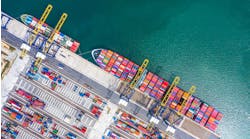Import cargo volume at the nation’s major retail container ports is staying at about the same levels as last year this summer, but is expected to resume increases in the fall, according to the monthly Global Port Tracker report from the National Retail Federation and consulting firm Hackett Associates.
“With the economy facing continuing challenges, retailers are managing their inventory levels carefully,” says Jonathan Gold, NRF’s vice president for supply chain and customs policy. “But the increases in import volume expected this fall are a clear sign that retailers are confident consumer demand will be there in the fourth quarter.”
U.S. ports followed by Global Port Tracker handled 1.28 million twenty-foot equivalent units (TEUs) in May, the latest month for which numbers are available. That was up 6% from April and 1% from May 2010. It was the 18th month in a row to show a year-over-year improvement after December 2009 broke a 28-month streak of year-over-year declines. One TEU is one 20-foot cargo container or its equivalent.
June was estimated at 1.31 million TEUs, about eight-tenths of 1% down from June 2010 if the estimate holds true when final numbers become available. July is forecast at 1.36 million TEUs, which would be a 1.3% decrease from a year ago, and August is forecast at 1.43 million TEUs, up six-tenths of 1% from last year. Stronger increases are expected to return in September as retailers begin to stock up for the holiday season, with volume forecast at 1.47 million TEUs, up 10% from last year. October is forecast at 1.53 million TEUs, up 18%, and November at 1.41 million TEUs, up 19%.
The first half of 2011 is estimated at 7.2 million TEUs, up 5% from the first half of 2010. Imports during 2010 totaled 14.7 million TEUs, a 16% increase over 2009.
“The low level of inventories-to-sales ratios suggest that import container flows will continue at their suppressed levels for the summer” says Ben Hackett, founder of Hackett Associates. “On the bright side, there will be no imminent boom or bust in volumes as we experienced in 2007 and 2010.”
Global Port Tracker covers the U.S. ports of Los Angeles/Long Beach, Oakland, Seattle and Tacoma on the West Coast; New York/New Jersey, Hampton Roads, Charleston and Savannah on the East Coast, and Houston on the Gulf Coast.


